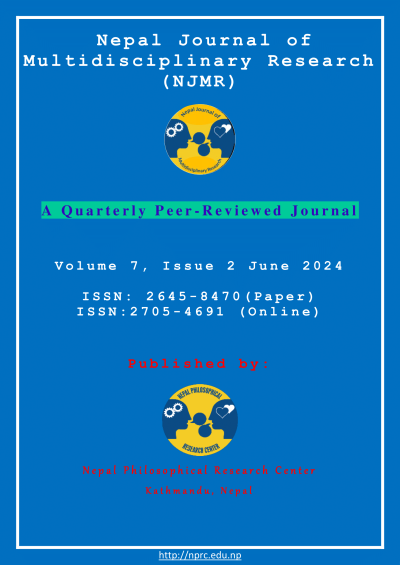Discerning the Distinctive Characteristics of Key Research Paradigms and their Constituents
DOI:
https://doi.org/10.3126/njmr.v7i2.68191Keywords:
research, epistemology, ontology, methodology, research paradigmsAbstract
Background: Research paradigms are the underlying philosophical and theoretical frameworks that guide research studies. This article identifies and discusses key research paradigms: positivism, postpositivism, pragmatism, constructivism, interpretivism, and advocacy. Additionally, it explores their prominent constituents: ontology, epistemology, axiology, and methodology.
Methodology: The article has been prepared through a thorough review of key texts regarding research paradigms in books and journal articles. This literature review method ensures a detailed and accurate portrayal of the paradigms and their constituents.
Findings: Positivism emphasizes empirical evidence. Postpositivism recognizes the role of values and subjectivity. Pragmatism evaluates theories based on practical usefulness. Constructivism views knowledge as constructed by individuals through experiences. Interpretivism emphasizes understanding and interpreting the meanings people attach to their experiences. Advocacy or participatory research stresses the active involvement of community members and stakeholders in the research process. Ontology studies the nature of existence. Epistemology involves discerning the characteristics and limits of knowledge. Axiology examines values and what is considered good and valuable. Methodology systematically analyzes methods in a field of study.
Conclusion: Understanding research paradigms has practical implications for researchers. It aids in pursuing the research process, selecting appropriate methodologies, and enhancing the credibility of their studies. This understanding ensures that research is methodologically sound, ethically robust, and socially impactful.
Novelty: This article provides a synthesized overview of the major research paradigms and their key components, offering a valuable resource for researchers to understand and navigate the complexities of research methodologies and philosophical frameworks.
Downloads
Downloads
Published
How to Cite
Issue
Section
License
Copyright (c) 2024 The Author(s)

This work is licensed under a Creative Commons Attribution-NonCommercial 4.0 International License.
This license enables reusers to distribute, remix, adapt, and build upon the material in any medium or format for noncommercial purposes only, and only so long as attribution is given to the creator.




